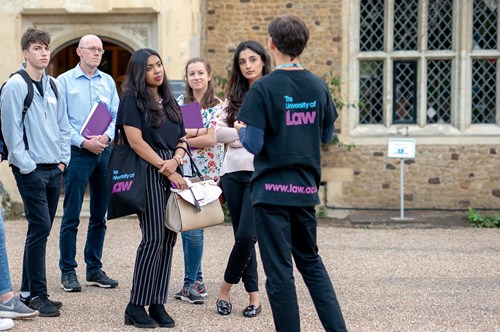Course Details
MSc Criminology and Criminal Justice
If you’re looking to enhance your knowledge in criminology or make a change to the discipline, then our Master’s in Criminology and Criminal Justice is the next step to take on your career journey.
Taught by lecturers with significant professional experience, you will gain a systematic understanding and critical awareness of key principles of criminology, developing knowledge of the history of ideas, the cultural context, and the social and political theories that inform and influence the practice of criminology.
Students will graduate with the ability to identify appropriate methodologies for dealing with complex problems and design and successfully complete a substantial empirical criminology research project, systematic review or systematic case study, informed by wide understandings of criminology in the contemporary world.
What makes this course unique is our professional focus, choice of routes and teaching approach. For example, you will be taught to analyse the intersectionality of criminology topics in relation to criminal justice organisations and responses to crime, harm, deviance and victimisation.
You will be taught and engage with a wide range of research methods which will enable you to conduct your own impactful research. Much of this course focuses on topical debate – helping you to look at things critically and from different perspectives. You also have a choice of two routes to take on your course:
- Desistance and Resettlement Route: You will have the opportunity to engage with key issues related to prisons, probation and rehabilitation and resettlement. You will also be able to work with criminal justice organisations and people with prison experience on a digital co-production project. This route is ideal for those keen to work within the criminal justice system, especially the third sector, prison and probation.
- Social Justice Route: This route takes a critical approach in investigating the criminal justice system. It examines how the system has been perceived and resisted by those working outside of institutional power structures. It investigates how criminology is a ‘rendezvous discipline’ by engaging with, and pushing at, the margins of the discipline, the relationship between social marginalisation and criminalisation, and how to put the ‘margins’ at the centre. This route is ideal for those who want to work to shape the system from either outside or within the system.
Both routes provide the opportunity for real-world experience, for example through ride alongs with the City of London Police and other employability activities arranged through our team.
Criminology Career Prospects
The combination of theory, practice, and applied research on this MSc Criminology and Criminal Justice course gives you the capacity to look further and to imagine otherwise, preparing you for a rewarding career beyond the disciplinary study of Criminology.
The broader vocational significance of the programme means graduates are sought after across sectors. Jobs in Criminology and Criminal Justice have good job stability and security and there are many job opportunities with a Criminology Master’s degree.
The main careers for Criminology graduates are within the police, prison and probation service, court and security services, civil service, not-for-profit organisations (especially those that work with young offenders, ex-offenders or crime victims), social care, and academia, but also other areas such as education, journalism, intelligence services, business, and the military.
Why study MSc Criminology and Criminal Justice with us?
- Work Experience Opportunities: The embedding of our digital co-production opportunity, utilising our connections with the Prison and Probation Service and charitable organisations is unique to us.
- Award-winning Employability support: From day one to beyond graduation, you’ll have access to 1:1 support from our dedicated Employability Service to help you stand out in the job market with career planning, work experience and other support tailored to your ambitions.
- Soft Skill Development: Our practical course assists with the development of soft skills, both important to the profession, and that employers find desirable. Helping you to learn skills like critical thinking, problem solving and how to articulate yourself.
Course Structure
Terms 1 and 2 are for taught modules. Terms 2 and 3 are for the research and writing up of the dissertation or project.
Term 1 has 2 taught modules, terms 2, 3, 4 and 5 have 1 taught module. Terms 5 and 6 are for the research and writing up of the dissertation or project.
Year One
Full-time
- Criminology Harms and Power 30 credits (Compulsory)
- Crime and Criminal Justice 15 credits (Compulsory)
- Research Methods 30 credits (Compulsory)
- Transforming Social Policy 15 credits (Compulsory)
- Identity, Diversity and Human Rights 15 credits (Optional)
- Desistance and the Carceral State 15 credits (Optional)
- Criminology at the Margins 15 credits (Optional)
- Resistance Activism and the State 15 credits (Optional)
- Dissertation or Digital Coproduction and Rehabilitation Project 60 credits (Compulsory)
Part-time
- Criminology Harms and Power 30 credits (Compulsory)
- Research Methods 30 credits (Compulsory)
- Transforming Social Policy 15 credits (Compulsory
- Identity, Diversity and Human Rights 15 credits (Optional)
- Criminology at the Margins 15 credits (Optional)
Year Two
Part-time
- Crime and Criminal Justice 15 credits (Compulsory)
- Desistance and the Carceral State 15 credits (Optional)
- Resistance Activism and the State 15 credits (Optional)
- Dissertation or Coproducing in Criminal Justice: Digital Desistance Project 60 credits (Compulsory)
Course Start Dates
-
MSc Criminology and Criminal Justice
- Full-time: London Bloomsbury and Manchester
- Part-time: London Bloomsbury and Manchester
-
MSc Criminology and Criminal Justice
- Full-time: London Bloomsbury and Manchester
- Part-time: London Bloomsbury and Manchester
Online
Study MSc Criminology and Criminal Justice Online starting October 2026 or February 2027
New in 2025
A new financing option provided by third-party firm StepEx is now available for selected courses.
Find out more

















